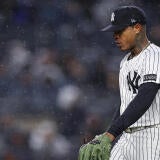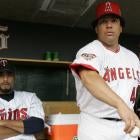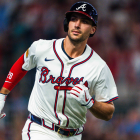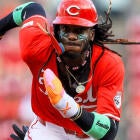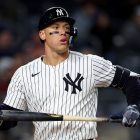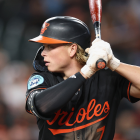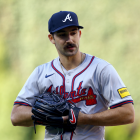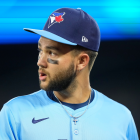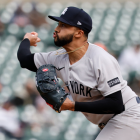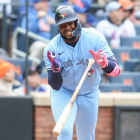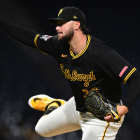Over in Japan, NPB officials decline to give out the Sawamura Award (the league's equivalent of the Cy Young) this season because they decided no pitcher was worthy of it. That's pretty funny, no? It got me thinking about if this was ever an option in Major League Baseball and what seasons in which it might've happened. As I looked through the votes from the past four decades, I did notice that, on numerous occasions, awards went to players who didn't really deserve them -- at least compared to someone who finished behind them in the voting. With that in mind, I decided to highlight some of the worst votes for the NL/AL MVP or Cy Young winners.
Let's go with the 20 worst MVP or Cy Young votes in the last 40 seasons. Those are nice round numbers and we aren't getting too far back in the past. Through the years, what is valued in baseball evolves. A good way to find what we now consider bad votes is to look at divides in on-base percentage versus stuff like batting average and RBI when it comes to hitters. WAR can be handy, but it never tells the whole story. We know the W-L record can cloud things on the pitching side and through the '80s and early '90s there was too much of a fixation with closers. So while we now regard some of these votes as lamentable, back in the day they weren't really thought of that way. Which is fine. Times change. We know better now, though, so it doesn't hurt to point out the flawed votes.
We'll go in reverse chronology. Please note that I said the 20 worst and that there are plenty of other questionable votes when viewed through the lens of how we value players these days.
2006 AL MVP
One of the few things Derek Jeter never accomplished in his storied career was winning the MVP. Was he robbed here? Justin Morneau was the winner in 2006, but he was the third most valuable player on his own team after Johan Santana and Joe Mauer. The 130 RBI seemed to do the job, but David Ortiz had 137. Going simply by WAR, Santana should have won, but Jeter's all-around case was strong, too. Regardless, we'd like to change this one.
2005 AL Cy Young
We were still stuck in the "wins" mode. Bartolo Colon won 21 games compared to Johan Santana's 16. Otherwise, check this out.
Colon: 3.48 ERA, 122 ERA+, 1.16 WHIP, 157 K, 43 BB, 222 2/3 IP, 2 CG, 0 SHO, 4.0 WAR
Johan: 2.87 ERA, 155 ERA+, 0.97 WHIP, 238 K, 45 BB, 231 2/3 IP, 3 CG, 2 SHO, 7.2 WAR
That's not even close. Johan should have three Cy Youngs and possibly an MVP (see 2006).
1999 AL MVP
Ivan Rodriguez had a great season and, generally speaking, I'm in favor of position players over pitchers for MVP, but Pedro Martinez was out of his mind during one of the most offensively prolific seasons in history. To sum up how ridiculous offense was in 1999, A-Rod had 42 homers and 111 RBI and finished 15th in AL MVP voting. Sammy Sosa hit 63 homers and finished ninth in NL MVP voting. Meanwhile, here's Pedro:
23-4, 2.07 ERA, 0.92 WHIP, 313 K, 37 BB, 213 1/3 IP, 9.8 WAR (compared to 6.4 WAR from Ivan Rodriguez).
The next closest person to Pedro's 2.07 ERA was David Cone at 3.44. Second to Pedro's 0.92 WHIP was Eric Milton at 1.23. Second to the 9.8 WAR was Jeter at 8.0. Pitchers need to be on a completely different level for me to support them for MVP and Pedro Martinez was in 1999.
1998 AL MVP
Juan Gonzalez won rather easily in a sign of the times, as he homered 45 times and drove home a whopping 157 runs. He hit .318 with a .366 on-base percentage, too, so it looks like a monster season. It was. It's just that offense was off the charts in this time period and Gonzalez was pretty one-dimensional. Ken Griffey Jr. hit 56 homers and drove home 146 while also stealing 20 bases and playing stellar defense in center. Nomar Garciaparra hit .323/.362/.584 with 35 homers and 122 RBI while playing shortstop. Derek Jeter hit .324 with a .384 OBP, 19 homers, 30 steals and 127 runs while playing short. Albert Belle hit .328.399/.655 with 48 doubles, 49 homers and 152 RBI, leading the league in OPS, OPS+ and total bases. A-Rod, who finished ninth in the vote, hit .310/.360/.560 with 42 homers, 124 RBI, 123 runs and 46 steals while playing short.
Here's Gonzalez's WAR vs. those guys:
- A-Rod, 8.5
- Jeter, 7.5
- Garciaparra, 7.1
- Belle, 7.1
- Griffey, 6.6
- Gonzalez, 4.9
If we had a re-vote, Gonzalez doesn't crack the top five.
1998 NL Cy Young
Kevin Brown was often short-changed in voting and there's plenty of speculation it had to do with his crusty personality with the media (which shouldn't matter, by the way). Tom Glavine won the vote, but I think Brown should have. Let's go side-by-side:
Glavine: 20-6, 2.47 ERA, 1.20 WHIP, 157 K, 74 BB, 4 CG, 3 SHO, 229 1/3 IP, 6.1 WAR
Brown: 18-7, 2.38 ERA, 1.07 WHIP, 257 K, 49 BB, 7 CG, 3 SHO, 257 IP, 8.6 WAR
If it matters, both players pitched for division winners. Gimme Brown.
1996 AL MVP
Uh oh, we're gonna pick on Juan Gone again. This vote was razor thin, with Gonzalez getting 290 vote points against A-Rod's 287. It shouldn't have been close. Both A-Rod and Griffey were better all-around players. Take a look:
Gonzalez: .314.368/.643, 33 2B, 47 HR, 144 RBI, 89 R, 2 SB, 3.8 WAR
A-Rod: .358/.414/.631, 54 2B, 36 HR, 123 RBI, 141 R, 15 SB, 9.4 WAR
Junior: .303/.392.628, 26 2B, 49 HR, 140 RBI, 125 R, 16 SB, 9.7 WAR
The Rangers won the division while the Mariners missed the playoffs, so it's possible that was at play here. At the time, WAR wasn't on anyone's radar, but do we really need that to know A-Rod and Griffey were good at defense and baserunning while Gonzalez wasn't?
1996 NL MVP
In going through all these votes, I noticed that voter fatigue is a real thing. I already suspected it, but there were multiple cases where players like Roger Clemens, Randy Johnson and Albert Pujols should have won but were likely cost more hardware because voters, deep down, just didn't feel like picking the same guy over and over. Barry Bonds was probably cost the most, which is amazing given he won seven MVPs. He should have won about 10. In 1996, Bonds led the NL in WAR while posting a .461 OBP and .615 slugging. He had 42 homers despite 151 walks (30 intentional) and also stole 40 bases. He finished fifth in the vote, though. Ken Caminiti was the winner.
1995 AL MVP
Several other players have a case over Mo Vaughn, but let's simply compare him to Albert Belle.
Belle: .317/.401/.690, 52 2B, 50 HR, 126 RBI, 121 R, 7.0 WAR
Vaughn: .300/.388/.575, 28 2B, 39 HR, 126 RBI, 98 R, 4.3 WAR
Belle led the AL in runs, doubles, homers, RBI (tied), slugging and total bases. Vaughn tied Belle in RBI and led the AL in strikeouts.
This wasn't a case of the team factoring in, either, as Belle's Indians went 100-44 for the best record in baseball. Yes, look at Belle's numbers and realize this was a strike-shortened season. He was jobbed here.
1993 AL Cy Young
Did having a cool nickname benefit "Black Jack" Jack McDowell? It couldn't have hurt, but I'm guessing the White Sox winning the division and McDowell leading the league with 22 wins had more to do with it. It's supposed to be an award for the best pitcher, though, and look at Kevin Appier. He had McDowell by 0.81 in ERA with more strikeouts, a better WHIP and more than doubled him in WAR (Appier 9.3 to 4.4 for McDowell).
1992 AL MVP/Cy Young
Double whammy here as A's closer Dennis Eckersley won both awards. The Hall of Famer had an exceptional season, but he still only faced 309 batters in 80 innings of work. Compare that to players who rack up over 600 plate appearances or starting pitchers working 250 innings. He certainly had an impact, but you can't convince me the most valuable player in the league pitched 80 innings and that was it.
On the MVP side, Kirby Puckett put up 7.1 WAR for a 90-win Twins team. Mark McGwire (from a division winner), Roberto Alomar (from a division winner) and Frank Thomas also had strong cases.
Roger Clemens (voter fatigue!) was 18-11 with a 2.41 ERA in 246 2/3 innings. Mike Mussina was 18-5 with a 2.54 ERA in 241 innings.
1991 NL MVP
Bonds won MVP the previous season while Terry Pendleton was a veteran newcomer to a Braves team that went worst-to-first. Bonds never had a shot, even though he was better.
Bonds: .292/.410/.514, 28 2B, 5 3B, 25 HR, 116 RBI, 95 R, 43 SB, 8.0 WAR
Pendleton: .319/.363/.517, 34 2B, 8 3B, 22 HR, 86 RBI, 94 R, 10 SB, 6.1 WAR
Narratives can be strong and that was certainly the case in 1991, though it was a close vote.
1990 AL Cy Young
Bob Welch over Roger Clemens was a complete debacle. Though Clemens had already won two Cy Youngs and an MVP, I suspect this was less fatigue and more wins. Welch won 27 games. We could use more context, though. Welch won 27 games for a team that won 103 while Clemens won 21 for a team that won 88. Should that alone really have swung things?
The answer should be no, and everything else is a landslide in Rocket's corner. Clemens had a 1.93 ERA compared to Welch's 2.95. Clemens struck out 82 more hitters in 9 2/3 fewer innings while walking 23 fewer hitters. Welch allowed 26 homers to Clemens' seven. They didn't have WAR then, but it's a good illustration of how bad this vote was: Clemens wins 10.4 to 2.9.
1989 NL Cy Young
Mark Davis had an amazing season for the Padres. He worked 92 2/3 innings in relief, closing down 44 saves in 48 chances with a 1.85 ERA. I realize Orel Hershiser being 15-15 in 1989 was a non-starter when it came to people maybe throwing him a first-place vote, but W-L is a team stat. Hershiser worked 256 2/3 innings while facing nearly three times the number of hitters Davis did. Hershiser pitched to a 2.31 ERA and posted 7.0 WAR compared to Davis' 4.4 (which, by the way, is a ridiculous WAR for a reliever).
1987 NL/AL MVP
The league exploded with home runs in 1987, so voters didn't seem to know what to do other than throw the votes to Andre Dawson and George Bell.
The NL side of this hurts, given that I was a nine-year-old Cubs fan who decided to wear No. 8 in Little League for the foreseeable future thanks to The Hawk.
The adult in me, however, realizes narrative played a large role here, with Dawson taking a blank check to Wrigley Field and wanting to sign with the Cubs no matter what. He became a hero in Wrigley, with Andre's Army bowing down to him in the right field bleachers.
Dawson was great with 49 homers and 137 RBI. Team that with the narrative and he won MVP from a last-place team. He also posted a below average on-base percentage (.328 vs. a .331 league average). Think about that. A player on a last-place team who was below average at not making outs won MVP.
Tony Gwynn finished eighth while hitting .370/.447/.511 with 36 doubles, 13 triples, 56 steals, 119 runs and an MLB-best 218 hits. His 8.6 WAR dwarfed Dawson's 4.0, but he only hit seven home runs. What about Eric Davis? He slashed .293/.399/.593 with 37 homers, 100 RBI and 50 steals. The Gold Glover had 7.9 WAR. Dale Murphy had a strong season, too.
The AL side was similarly flawed with Bell's 47 homers and 134 RBI. Alan Trammell and Wade Boggs were better all-around players, though.
Bell: .308/.352/.605, 32 2B, 4 3B, 47 HR, 134 RBI, 111 R, 5 SB, 5.0 WAR
Trammell: .343/.402/.551, 34 2B, 3 3B, 28 HR, 105 RBI, 109 R, 21 SB, 8.2 WAR
Boggs: .363/.461/.588, 40 2B, 6 3B, 24 HR, 89 RBI, 108 R, 1 SB, 8.3 WAR
Gimme Boggs, who was perpetually underrated in MVP voting throughout his career, I suspect due to the relatively low homer totals.
1984 AL MVP/Cy Young
Willie Hernandez was great, but let's reiterate a closer shouldn't be winning MVP. He did pitch a ton of relief innings: 140 1/3 to be exact, and faced 548 batters.
Still, Hall of Famer Eddie Murray played all 162 games and hit .306/.410/.509, leading the majors in OPS+ (157) and posting 7.1 WAR to Hernandez's 4.8. Trammell and Dave Winfield had strong cases as well.
On the pitching side, both Bert Blyleven (19-7, 2.87 ERA, 12 CG, 4 SHO) and Dave Stieb (16-8, 2.83 ERA, 11 CG, 2 SHO) faced nearly twice as many batters as Hernandez and posted WARs above seven.
1982 AL Cy Young
Harvey's Wallbangers carried the day in the AL, with the Brewers taking MVP (Robin Yount, a correct choice) and Cy Young. Dave Steib was robbed, though, against Pete Vuckovich, who would later go on to play Clu Haywood in "Major League."
Vuckovich: 18-6, 3.34 ERA, 1.50 WHIP, 105 K, 102 BB, 9 CG, 1 SHO, 223 2/3 IP, 2.8 WAR
Steib: 17-14, 3.25 ERA, 1.20 WHIP, 141 K, 75 BB, 19 CG, 5 SHO, 288 1/3 IP, 7.6 WAR
1981 AL MVP
You knew I wasn't gonna like a closer winning MVP, and here we go again with Rollie Fingers. What's funny is the starting pitching selection in 1981 was mediocre enough that Fingers was justifiable to win the Cy Young. But a pitcher who faced 297 hitters in 78 innings winning the MVP? C'mon. Even in a strike-shortened season, that's not OK. Rickey Henderson hit .319 with a 408 on-base percentage, 56 steals and 89 runs scored in 108 games. Dwight Evans posted a .415 OBP with a .522 slugging. Both players were at 6.7 WAR in 108 games played. That's exceptional and either one would've been a fine choice.
![[object Object] Logo](https://sportshub.cbsistatic.com/i/2020/04/22/e9ceb731-8b3f-4c60-98fe-090ab66a2997/screen-shot-2020-04-22-at-11-04-56-am.png)


